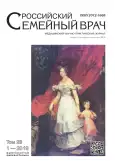Vol 23, No 1 (2019)
- Year: 2019
- Articles: 5
- URL: https://journal-vniispk.ru/RFD/issue/view/657
- DOI: https://doi.org/10.17816/RFD20191
Lectures
Malnutrition in the elderly and old age
Abstract
The prevalence of malnutrition in people over 60 is 10–40%. Inadequate nutrition worsens the quality of life and the functional status of patients in elderly and senile age. The development of eating disorders may be due to various factors. Diagnosis of malnutrition is aimed at identifying it and finding the causes. Treatment should be comprehensive, including adequate nutritional support and correction of factors leading to the development of malnutrition. It must be remembered that some eating disorders can cause the development or progression of various geriatric syndromes (falls, urinary incontinence, cognitive disorders, depression, etc.)
 5-15
5-15


Review
Cardiac rehabilitation today: opportunities and challenges
Abstract
Russian health care faces the task of reducing mortality and disability of patients with coronary heart disease. This problem could be solved with outpatient rehabilitation and secondary prevention. Despite of numerous evidences of their effectiveness there is no publicly available system for the management of patients with the addition of non-drug treatments to drug therapy in our country. This is due to the lack of material and technical base, a sufficient number of specialists, underestimation of this method by the physicians and low patients’ motivation. A special problem is the patient behavior itself, which can be described as “irrational”.
 17-26
17-26


Articles
New guidelines on cardiovascular diseases and the results of clinical research: Review of European Cardiology Congress 2018
Abstract
In this review the information is presented about new clinical guidelines on arterial hypertension, syncope guidelines, about screening of atrial fibrillation and antithrombotic and anticoagulants usage according clinical trials data. Attention is payed to digital technologies in health care sector. This information is based on data of European Cardiology Congress 2018.
 27-34
27-34


Original study article
The primary accreditation. The ways of the problems solving related to the preparation of graduates of medical universities
Abstract
The article is devoted to the study problems associated with the education of graduates of medical universities. The aim of the study is to explore possible ways to optimize the training of students for the practical exam in the simulation center, taking into account their educational needs A questionnaire was developed to assess students ‘attitude to choosing the optimal method of training, including questions about the socio-demographic characteristics of the respondents, the most difficult practical exam stations, the choice of the optimal method of training and the level of students’ involvement into the process of self education for the exam during the 6th year. Statistical data processing was performed using the SPSS 20.0 software package (SPSS Inc., Chicago, IL, USA). The study included 100 students randomly selected from among those enrolled in the 6th year of the medical faculty of the NWSMU. I.I. Mechnikov. Data analysis showed that the most difficult stations are “Providing emergency medical care” and “Emergency states”. The “training with a teacher in a simulation center” had the highest rating from all proposed education methods. Neither the socio-demographic characteristics nor the form of funding for education had an effect on this choice. Despite of fears related to the complexity of these stations, the number of people trying to master them was 40%. Conclusions. 1. The most difficult for students are the skills of providing emergency medical care. This choice was not influenced by gender, age or experience in the health care system. 2. It is necessary to make changes in the curricula of medical students in accordance with the requirements of the professional standard of the district physician, whose work functions include the provision of emergency medical care. 3. The involvement of teachers into the process of preparing students for emergency and urgent care should begin at the 5th year and be systematic. 4. It is necessary to motivate students to systematic self-study of materials on the methodology for providing emergency and urgent care presented on the website of the Methodological Center for Accreditation.
 35-40
35-40


Medical Education
Innovative teaching methods: the experience of annual spring school of practical geriatric
Abstract
The article analyzes the features of teaching geriatrics in the modern world on the example of the educational project “Annual Spring School of Practical Geriatrics”, proves the need to use innovative techniques for effective and rapid training of geriatrics, in accordance with the needs of society and official government documents.
 41-48
41-48








